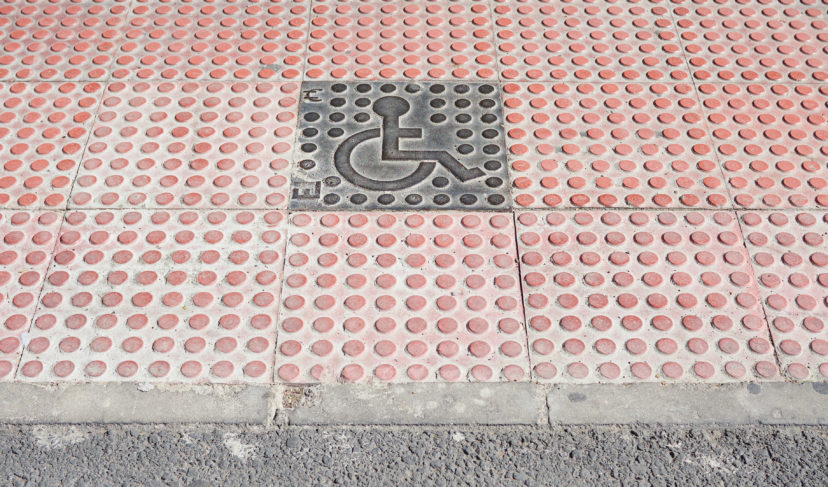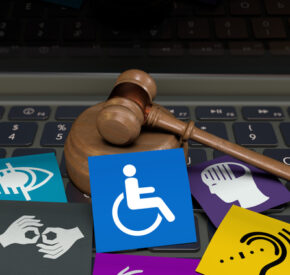I Just Want to Work
Job search strategies for employees with disabilities

Ten years ago, even though I had earned my final Masters degree the year before, I was still working in the entry-level position that had gotten me through graduate school. One day, I received a request for an interview at 9:00 AM on a weekday morning in another state. I was applying to work in an institution which served students who are blind. Because the interview request did not come with a free train ticket or hotel accommodations, I asked if there was any way we could make the interview one hour later. The earliest available train would get me into the station on time, I explained, but if the train was at all delayed, I would be late for the interview. In the letter, I didn’t add that I’m blind, so driving was not an option, but I’m sure the letter implied as much. An hour later, I received an automated email cancelation of the interview with no follow-up explanation.
I realize that I am lucky. I come from a place of privilege as a white woman with a strong educational background who was working. Eventually, I would even get one!
I’m also fortunate, because in my professional life, the example above is one of the more ludicrous discrimination examples which I have faced so far—or rather didn’t face, because I really couldn’t do much about it except move on. I’ve had happy interview experiences which ended with a job offer I could weigh carefully against my life circumstances. I’ve had less ideal interview experiences in which I was pretty sure I’d been given a more or less fair chance, and either I hadn’t measured up or someone else had measured up better. I’ve had other interviews with slight hesitations or pregnant pauses which left me to wonder and never know for sure about my discrimination status. And I had one group interview experience which, though painful, makes me laugh when I think back on it. I was with one male candidate and one other female candidate, and I was having the out-of-body experience of observing myself colossally failing this interview. At the end, as I was descending in the elevator to exit the building, the other female job candidate, most likely without a disability, turned to me and said, “He got it.” He sure did.
In the days before the Americans with Disabilities Act, employers often let prospective employees know in no uncertain terms that they would not hire people with disabilities. After the ADA, it sometimes seems like the only thing that has changed about looking for a job when you have a disability is that the explanation of the employer’s biases is gone. There’s always another reason: lack of experience is the primary culprit, of course, but more often than not, there is no reason at all.
Applicants with and without disabilities never really know why they were turned down for a job offer, but when you have a visible disability as I do, you’re often left to wonder whether you did something to seem a little too disabled. Did your “elevator pitch” not come out quite right? Did you talk too much or too little about how you would perform the tasks outlined in the job description despite or because of your disability? In other words, it is exhausting and excruciating.
I’m a teacher of blind students and have served as a mentor to students with and without disabilities. I’m also a professional who is approximately halfway through her working life, and I imagine I’ll participate in further job interviews. This realization keeps me humble, because I will most likely run into possible but ultimately unprovable discrimination. Or, on the flip side, I’m an introvert and, like many people, hate performance interviews. Maybe I won’t be meant for a job, even if the interviewer has hired amazing employees with disabilities in the past; there was just a more qualified applicant—but I’ll still wonder. Gone are the days when people worked for one company for forty years, and even if I have more job experience than I did a decade ago, I’ll still be, in a sense, starting over. But my point is: applying for jobs is almost always hard; if you have a disability, it’s almost never easy.
Below I’ll outline some tips for prospective employees with disabilities which I hope will ease the job search. The examples I’ll use to illustrate my points will primarily come from the blindness community, as that is the community with which I have the most familiarity. While different disabilities offer unique considerations as employers provide accommodations, and while no two individuals with the same disability present in the same way, it is my fervent hope that aspects of these examples are general enough to transcend across disability experiences.
Go for your career goal, even if it’s unconventional
When I was growing up, it seemed as if there was a list of career goals that people involved in transition deemed acceptable for youth who were blind. “Writer” was clearly not one of them, and possibly for good reason. My stated goal when going into college, after a few raised eyebrows, was “teacher of English,” and even that felt like a small, obscure victory, because at the time, I wanted to teach any and all students. (I’ve changed my mind a few times, as my course records prove.) It felt like my goal of English teacher had received the golden seal, “this is the one thing this blind student will do for the rest of her life.” I am now a teacher of blind students and a writer … for this year, so the high stakes of getting my goal stamped on a form seem especially ludicrous now.
I wish that “writer” was a goal option, provided I articulated a clear plan for getting there, as well as a backup plan to go alongside it, in case I did not write the next bestseller(s). I know, I know, transition dollars are an investment. But I still advocate that following your passions is one of the most important things you can do, so that you can bring as much joy into difficult work as possible. Think clearly about what you want to do, have a solid plan both for getting there and for good work along the way, and be ready for your goals, the economy, or your work situation to change.
Get as much experience as you can
Participating in extracurricular activities or demonstrating passion often get people into colleges over raw academic scores. Similarly, the names of your degrees by themselves don’t do as much for your job application materials as the experience you’ve had with putting your passions into practice or with gaining soft skills that are useful for work.
The logical question is: how does one gain this experience? The simple answer is: show up, check-in and/or volunteer; when you are a person with a disability, however, showing up, checking in and volunteering are not always as simple as they might seem. Showing up can include attending meet ups or events that discuss topics you are interested in. Checking-in can include engaging with prospective employer’s social media or other external communications. These activities offer a chance to shine, demonstrate expertise, or learn more about the experience you need to succeed. The truth is, it can also expose your disability or lack of knowledge. The options for these activities have exploded now that many internships accommodate work-from-home arrangements. However, prospective organizations sometimes consider disability to be a liability, or they don’t want to accommodate a volunteer, or they don’t have the resources to do so. These activities should be taken seriously, but it is also important to remember that they not make or break – they are opportunities to grow.
The answer: networking or relationship building … again. Sometimes networking literally means flinging out a very wide net. Reach out to your professors for contacts around your college campus, or alumnx who have a job in the field that interests you. Reach out to organizations for people with your disability, as many organizations at the national or state level have connections to employers who are interested in giving students with disabilities volunteer or internship experience. Finally, reach out to friends to find out what they’re doing. You never know when you might learn about new opportunities to explore.
Practice the elevator pitch; you are not the elevator pitch
The moment has come. It’s time to ace your first or one hundredth job interview. Are you ready?
When you have a disability, the decision of whether and how to disclose the idea that you need accommodations to work in a society that often doesn’t operate under universal design can be fraught with worry. Ultimately the decision is highly personal and not only changes from individual to individual, but is often affected by previous experience and the job to which you are applying. For instance, if you work in the disability space, disability is often an asset, while working outside of that space often means that people find more creative ways to show that they have adapted to working. (Note that there are exceptions to that statement on both sides!) The article, “Highlighting Your Abilities: Talking to Prospective Employers About Blindness or Low Vision,” goes over some of the considerations that people who are blind or low vision face about whether and how to disclose their blindness or low vision.
Many transition educators and career coaches recommend that it’s best for employees with disabilities to develop an “elevator pitch,” essentially a short introduction which highlights your abilities and passions and explains your disability in terms that someone with very little experience with disability can understand. Here is the first draft of a disability pitch I might give to a prospective employer now: “Hi! I’m Kristen. I am an educator and a published author, and my passion is working to improve the disability experience. I am totally blind, which means I don’t see at all. I use braille and text-to-speech screen-reading software to complete my work.” It’s good and could probably use a few improvements, but it opens the door for further questions about my experience and how I can help the organization achieve their objectives for the role. Now I have to practice, share with trusted advisors, and revise!
The disability pitch takes practice, not only so that you remember all of its moving parts, but precisely because the parts move. You are not a robot who spits out the same paragraph to every person you meet; you are a human who hopes to build rapport and develop a conversation. Introducing yourself to a fellow student is different from introducing yourself to a prospective employer, and indeed, introducing yourself to one employer is different from introducing yourself to another. Thus, it’s important to realize that “the pitch” is a guide that you should first memorize and then change up and adapt to each new situation.
But it’s equally important to remember that you are not your pitch, you are not a collection of accommodations. Seriously, my disability pitch bores me to death. Why? Because I’m a complex person with complexities that have nothing to do with blindness. When I talk to friends, I even have whole conversations that have nothing to do with this! And I’m someone with a work life in the disability space. So there’s no reason employers should not get a sense of your complexity as well, maybe not to the degree your friends and family members do, but showing them your whole self, because of, in spite of, and beyond your disability, can help people to understand the unique gifts and strengths you will bring to your work.
What happens next?
You did it! One way or another, you’ve completed the level of education you’ve completed, gained additional experience, and made it through your job interview. Of course, don’t forget to thank the employer for their time and reiterate in writing why you are the best fit for the job. Now what?
Just as you wait, sometimes forever, between the interview and the job offer, you will need to wait a couple of weeks for my follow-up article which will address what happens when you are or are not hired for the position for which you’ve worked so hard. After all, I’ve written long enough for this blog article. I hope Part II will be worth the wait.
___
Kristen Witucki is a Tamman partner and contributor. A published author and educator, she brings her lived experience and perspective to the Tamman Team.





